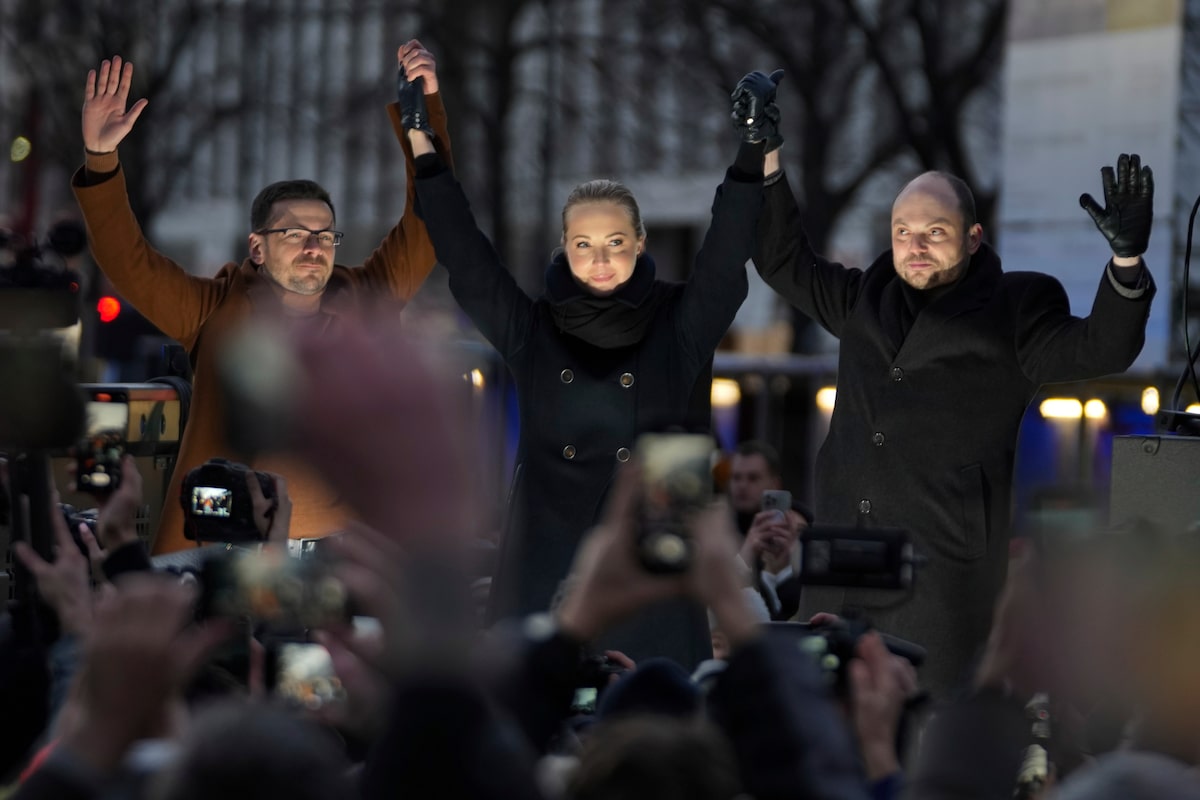From left, Russian dissidents Ilya Yashin, Yulia Navalnaya and Vladimir Kara-Murza during a demonstration in Berlin, Germany, November, 2024. The activists have personally suffered for their opposition to the Kremlin.Markus Schreiber/The Associated Press
Prime Minister Mark Carney’s government is making no promises after three prominent Russian dissidents asked him to grant asylum to colleagues at risk of being deported back to Russia by the Trump administration.
Three Russian public figures, including Alexey Navalny’s widow, this week wrote to Mr. Carney in an open letter, shared exclusively with The Globe and Mail, which said “several hundred opposition-minded Russians” who had entered the United States legally in hopes of receiving political asylum were instead being held in U.S. Immigration and Customs Enforcement detention centres.
Many of their claims are now being denied amid President Donald Trump’s campaign to dramatically cut back on the number of immigrants living in the U.S.
On Wednesday, however, the Canadian government offered no commitment to accept the Russian asylum seekers. Instead, it said any request for asylum would be considered on its own merits.
Laura Blondeau, director of communications to Immigration Minister Lena Diab, also noted that the Safe Third Country Agreement would apply to these cases. This bilateral refugee pact between Canada and the United States prevents most asylum seekers who pass through the U.S. from claiming protection in Canada – and vice versa.
Russian dissidents ask Canada to take in colleagues facing deportation in the U.S.
“Canada maintains a rigorous process to assess asylum claims that balance our humanitarian objectives, legal obligations, and safety and security measures,” Ms. Blondeau said.
“While we are unable to comment on individual cases, non-U.S. citizens who enter Canada legally are subject to the Safe Third Country Agreement, unless they qualify for an exception or exemption.”
She said any decisions about exceptions and exemptions to the agreement “are made independently by the Immigration and Refugee Board of Canada.”
In making decisions, Ms. Blondeau said, the board would consider whether an individual “has a well-founded fear of persecution based on race, religion, political opinion, nationality, or membership in a particular social group, or are at risk of torture, or cruel or unusual punishment.”
Russian dissidents may be able to successfully argue that they would face death or harm at the hands of police or state security services in Russia.
Letter to Canada asks for asylum for Russian dissidents facing deportation
Human Rights Watch, in a recent report that cited Russian rights group OVD Info, said as of June this year, at least 80 people prosecuted for political reasons “are suffering from illnesses in detention and do not receive timely medical care.”
The letter to Mr. Carney was signed by Yulia Navalnaya, Vladimir Kara-Murza and Ilya Yashin, three well-known activists who have personally suffered for their opposition to the Kremlin.
Ms. Navalnaya is the widow of Alexey Navalny, the Russian opposition leader who died under mysterious circumstances in an Arctic prison camp early last year. Mr. Kara-Murza and Mr. Yashin, meanwhile, were separately jailed for speaking out against Russia’s 2022 invasion of Ukraine. Both were released last year as part of a major prisoner exchange between Russia and the West.
All three are still active members of the anti-Putin opposition, which now exists largely outside of Russia. In an effort to energize and consolidate the Russian exile community, the three organized a pair of large anti-war protests in Berlin over the past year.
Mr. Kara-Murza plans to visit Canada in October to discuss the proposal with Canadian officials.
Mr. Yashin, in a recent interview, said he doesn’t think it would anger Mr. Trump if Canada accepted the Russian asylum seekers.
“I don’t think that this can become a cause of tension between Canada and the U.S., because Trump’s position is simply to kick out immigrants he doesn’t need. By and large, it makes no difference to him where they go – to Russia, Egypt, Europe, or Canada. I think that Trump absolutely doesn’t care,” Mr. Yashin said in a telephone interview Tuesday.
Asylum claims from U.S. citizens have jumped since Trump took office, figures show
It’s not the only asylum request being made of Mr. Carney. On Wednesday, Free Russia Foundation, a human-rights organization headquartered in Washington, also asked the Prime Minister to offer asylum to Ukrainians who initially fled to the United States as a result of Russia’s war on Ukraine.
“Since the full-scale invasion, many sought temporary protection in the United States but are now facing uncertainty in the American naturalization process,” said the Sept. 3 letter from Natalia Arno, president of Free Russia Foundation.
In January, Mr. Trump suspended the “Uniting for Ukraine” program that had allowed Ukrainians permission to stay in the United States for two years.
“As a result of the program’s suspension, thousands of Ukrainians in the U.S. remain without confirmed legal status and with the threat of deportation a concerning part of their everyday lives,” she said.
Ms. Arno asked Mr. Carney to establish a “special mechanism that would allow Ukrainians currently residing in the United States due to the war the ability to relocate to Canada and obtain legal status in your country.”
Ms. Blondeau said Canada has been a staunch supporter of Ukraine as it fights the Russian invasion.
“Since the start of Russia’s full-scale invasion in February, 2022, Canada has committed nearly $22-billion in multi-faceted assistance for Ukraine, including over $12.4-billion in direct financial support – the largest per capita financial contribution among G7 countries,” she said.
“Nearly 300,000 Ukrainians and their family members have been welcomed to Canada under the Canada-Ukraine Authorization for Emergency Travel.”

